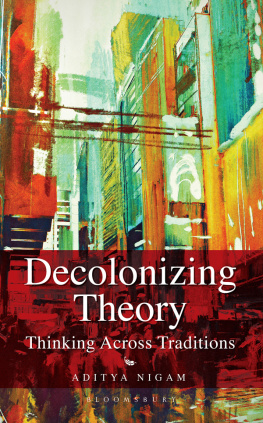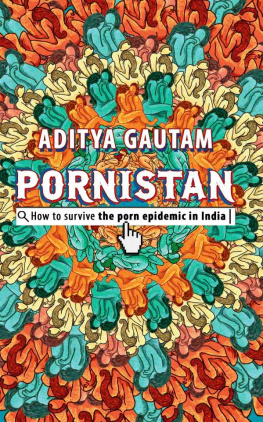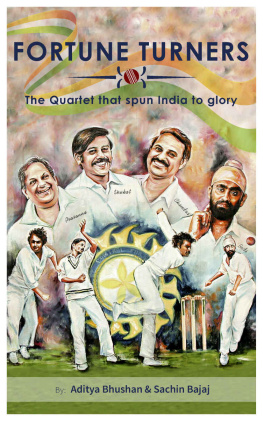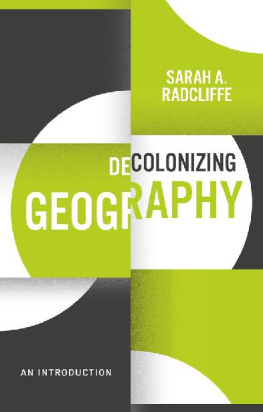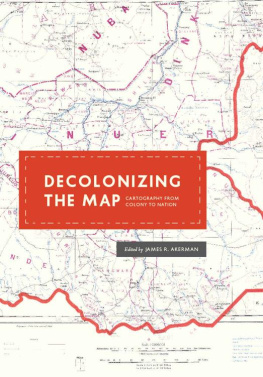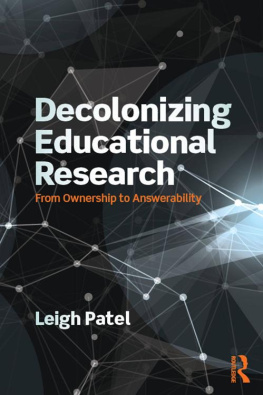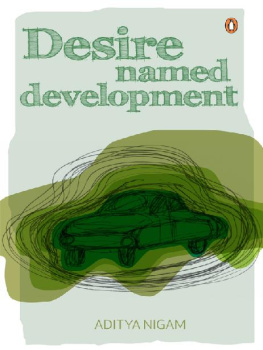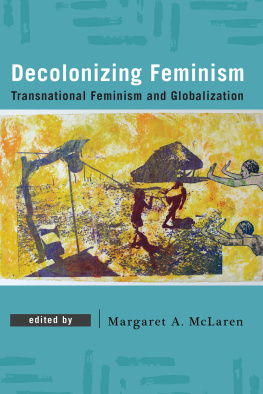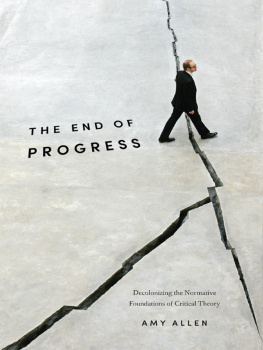Nigam Aditya - Decolonizing Theory: Thinking Across Traditions
Here you can read online Nigam Aditya - Decolonizing Theory: Thinking Across Traditions full text of the book (entire story) in english for free. Download pdf and epub, get meaning, cover and reviews about this ebook. year: 2020, publisher: Bloomsbury Publishing India Pvt. Ltd., genre: Politics. Description of the work, (preface) as well as reviews are available. Best literature library LitArk.com created for fans of good reading and offers a wide selection of genres:
Romance novel
Science fiction
Adventure
Detective
Science
History
Home and family
Prose
Art
Politics
Computer
Non-fiction
Religion
Business
Children
Humor
Choose a favorite category and find really read worthwhile books. Enjoy immersion in the world of imagination, feel the emotions of the characters or learn something new for yourself, make an fascinating discovery.
- Book:Decolonizing Theory: Thinking Across Traditions
- Author:
- Publisher:Bloomsbury Publishing India Pvt. Ltd.
- Genre:
- Year:2020
- Rating:3 / 5
- Favourites:Add to favourites
- Your mark:
- 60
- 1
- 2
- 3
- 4
- 5
Decolonizing Theory: Thinking Across Traditions: summary, description and annotation
We offer to read an annotation, description, summary or preface (depends on what the author of the book "Decolonizing Theory: Thinking Across Traditions" wrote himself). If you haven't found the necessary information about the book — write in the comments, we will try to find it.
Decolonizing Theory: Thinking Across Traditions — read online for free the complete book (whole text) full work
Below is the text of the book, divided by pages. System saving the place of the last page read, allows you to conveniently read the book "Decolonizing Theory: Thinking Across Traditions" online for free, without having to search again every time where you left off. Put a bookmark, and you can go to the page where you finished reading at any time.
Font size:
Interval:
Bookmark:

Decolonizing Theory
Decolonizing Theory
Thinking across Traditions
Aditya Nigam

BLOOMSBURY INDIA
Bloomsbury Publishing India Pvt. Ltd
Second Floor, LSC Building No. 4, DDA Complex, Pocket C 6 & 7,
Vasant Kunj New Delhi 110070
BLOOMSBURY, BLOOMSBURY ACADEMIC INDIA and the Diana logo are trademarks of
Bloomsbury Publishing Plc
First published in India 2020
This edition published 2020
Copyright Aditya Nigam, 2020
Aditya Nigam has asserted his right under the Indian Copyright Act to be identified as Author of this work
Bloomsbury Academic
An imprint of Bloomsbury Publishing Plc
All rights reserved. No part of this publication may be reproduced or transmitted in any form or by any means, electronic or mechanical, including photocopying, recording, or any information storage or retrieval system, without prior permission in writing from the publishers
Bloomsbury Publishing Plc does not have any control over, or responsibility for, any third-party websites referred to or in this book. All internet addresses given in this book were correct at the time of going to press. The author and publisher regret any inconvenience caused if addresses have changed or sites have ceased to exist, but can accept no responsibility for any such changes
ISBN: HB: 978-93-88630-46-7; eBook: 978-93-88630-48-1
2 4 6 8 10 9 7 5 3 1
Created by Manipal Digital
Bloomsbury Publishing Plc makes every effort to ensure that the papers used in the manufacture of our books are natural, recyclable products made from wood grown in well-managed forests. Our manufacturing processes conform to the environmental regulations of the country of origin.
To find out more about our authors and books visit www.bloomsbury.com and sign up for our newsletters
To my mother, Santwana Nigam, I dedicate this book.
Contents
This book has long been in the making in one sense, though I did not know that this would be the book I would be writing. At one level, the beginnings of it go back to my early intellectual engagement with the movements against mass dispossession in the early 1990s, movements that ranged from the Narmada Bachao Andolan to the movement in Singrauli where people were to be displaced for the second time in forty years. Coming out of a highly modernist Marxism, this problem of what I now callborrowing from Ernst Blochnon-synchronous modes of being posed an insurmountable theoretical and philosophical problem. The problem of uneven development in the language of Marxism that was still my language, led to a long and tortuous engagement with the problem of historical time. How do we think of these modes of being that are very much a part of our present? And what do we do? Do we simply sit back and watch them be uprooted, dispossessed and destroyed because that is apparently inevitable according to historys immanent logic? The 1990s was also the decade of neoliberalism, structural adjustment and privatization on an unprecedented scale. It was easythough immensely disturbingto see that neoliberalism and Marxism shared a fundamental ground of modernist thinking where it came to these non-synchronous modes of being. Indeed, many Indian Marxists, following the collapse of Soviet bloc state socialism, had even started seeing the collapse as a consequence of the fact that the USSR started building socialism in a society that was not fully capitalist.
From these state-owned mega-developmental projects displacing Adivasi and peasant populations to Singur and Nandigram in 2006 and 2007 in West Bengal, there was a straight line that connected the faith in industrialization and private corporate Capital as the saviours. It did not matter at all that there was a Left or Marxist government in powerCapital had to be wooed and invited to wreak havoc in the name of providing employment. The answer, if one dared ask why, was that that was how it happened in Europe! Something did not seem right at all here and, interestingly, only Marxists who managed to escape this fate of the Bengal Marxists were those who placed their theory of history in abeyance and decided to stand by the peasants and Adivasis. Needless to say, their faith in the peasantry or the people came from Maoism in some forma non-Western and complex formation that had continued to pay lip service to Marxism but transformed its practice quite a bit.
This was the beginning of a radical questioning of both the Western development and capitalist model as an ideal for others in the non-West to follow, and inextricably tied to it, the philosophy of history that justified it.
The crisis of secularism precisely in the same period, climaxing with the demolition of Babri Masjid, revealed another facet of our naive faith in the very same European model as it did our tendency to mindlessly mimic it. The return of castelong thought to be dead and a thing of the pastto the centre of our political life, following the implementation of the Mandal Commission, showed that secular/modern discourse was clueless about what it meant. This return of caste too went into constituting the same, extremely complex conjuncture of 19901992 and forced a rethink of the narrative of historical progress in another way.
The long and tortuous search for an answer had to go through another, perhaps even more fundamental realizationour entire way of doing theory was of simply setting up the Euro-American experience of modernity as the model, indeed destiny, for the rest of the world. So, has everything been already thought once and for all by Western philosophers and theorists? Is our job simply to apply that theory to our conditions with a modification here or a modification there? What about intellectual activity and thought in all these other parts of the world?
This was where, in a crucial sense, the impetus for those explorations came that have now come together in this book.
It has been a protracted journey of close to thirty years, in twenty of which, my long and immensely formative and productive relationship and partnership with Nivedita Menon has been crucial as it opened me out to new and completely different perspectives. The effects of this long collaboration, intellectually and politically speaking, show throughout the book in different ways. Her reading and comments on the previous draft have also been very useful.
I am also very much indebted to the members of the Reading Group on Non-Western Intellectual TraditionsRachana Johri, Mohinder Singh, A.K. Ramakrishnan, P.K. Datta and Niveditawith whom, for five years we collectively read texts from different traditions.
There are, of course, a large number of scholars whose thinking has been very important for opening out new pathways for my own and their debt will be visible in the book at different points. From 2010 on till 2018, I taught courses on Capital and then co-taught a course on Social and Political theory with two other colleagues at the Centre for the Study of Developing Societies (CSDS), where I work. These courses, taught in the CSDS summer teaching programme, Researching the Contemporary, ultimately became the occasion for acquainting myself with works from different intellectual and thought-traditions from different parts of the world. The intense interactions with students in those classes and their queries pushed me to think through some of the issues in greater depth. With regard to familiarizing oneself with the broadly Sanskritik thought traditions, I also received a lot of help and encouragement from Patrick Olivelle and Arindam Chakrabarti during their visits to CSDS. Both of them separately gave us a session with the Reading Group on Non-Western Intellectual Traditions, answering our questions and guiding us.
Font size:
Interval:
Bookmark:
Similar books «Decolonizing Theory: Thinking Across Traditions»
Look at similar books to Decolonizing Theory: Thinking Across Traditions. We have selected literature similar in name and meaning in the hope of providing readers with more options to find new, interesting, not yet read works.
Discussion, reviews of the book Decolonizing Theory: Thinking Across Traditions and just readers' own opinions. Leave your comments, write what you think about the work, its meaning or the main characters. Specify what exactly you liked and what you didn't like, and why you think so.

